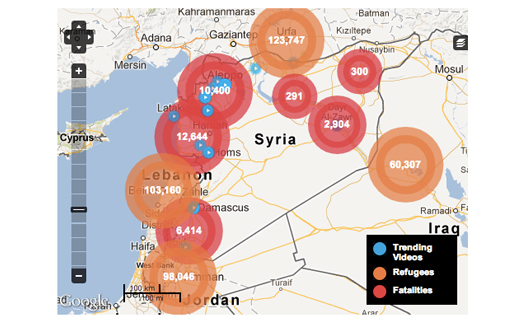Syria Explained: Syria Deeply Maps Conflict in Context with New Media Tools

 Far more complex than a simple revolution or
call for reform, the conflict in Syria continues to fascinate and
appall its witnesses, as its mangled bodies, haunted children, and
increasing cast of dubious characters make for a grim cabaret that
challenges the limits of a global audience’s ability to absorb,
much less understand.
Far more complex than a simple revolution or
call for reform, the conflict in Syria continues to fascinate and
appall its witnesses, as its mangled bodies, haunted children, and
increasing cast of dubious characters make for a grim cabaret that
challenges the limits of a global audience’s ability to absorb,
much less understand.
Whether seen as a free-for-all or a polarized proxy struggle
that will define the balance of power in the region for decades to
come, the story of Syria today challenges modern media to find an
angle that can capture enough of the truth to satisfy.
In a climate of news ADD and hashtag obsession, one platform
launched yesterday with a thoughtful answer to complexity. Syria Deeply promises to
deliver on its name, offering an in-depth look at the conflict from
all angles, with map-localized statistics, a description of
relevant players, a web of their local allegiances, and blog-style
firsthand accounts from Syria as well as daily written and audio
perspectives and social media updates.
It has something for every attention span, but leans towards
offering analysis and background; up to 75% of the site’s
information is either automated or static content, which gives
readers the “Syria files” they’ll need to decode daily news in
context.
For Armenian-American founder Lara Setrakian, who has family in
Syria and has worked in the Middle East for five years for American
media outlets ABC News and Bloomberg Television, building the site
over the past two and a half months was a personal calling. “To see
the Syrian crisis so chronically misunderstood by an American
audience was not acceptable. I couldn't see it and not do something
about it.”
While the site began with a series of scribbles in her notebook,
its focus on static content and expert perspective is data-driven.
“A recent Pew Center study found that the number one reason that
Americans don't follow more foreign news is a lack of background,”
she says. “The American news cycle and education system simply
doesn't deliver that.”
To fill that gap, she intends to make that background as easy to
understand as possible, using data visualization techniques (shown
in the site’s “Defection Tracker,” which monitors the status of
Assad allies).

Another large asset of Syria Deeply is the team’s own expert
knowledge. Its Twitter feed offers a curated list from trusted
sources, speaking to Setrakian’s finding that social media news
often leads mainstream outlets by 48 hours. The op-ed section
offers analysis from leading thinkers in the field.
This combination of political depth and technological vision
reflects Syria Deeply’s diverse set of partners, who include the
World Policy Institute, a non-profit think tank based in New York,
Google+, presentation platform Prezi, Soundcloud, State.com, and
mapping platform Ushahidi. With an arsenal of new media tools at
its disposal and a focus on user experience (UX),
“we’re going to get incredibly good at portraying complexity,” says
Setrakian. “How can you design something for maximum
comprehension?”
Monetizing new media
Beneath its expert coverage of a global crisis, the
ability to cover a complex issue well is the core value of Syria
Deeply, and one that Setrakian and her team of eight hope to scale.
“As we get better at depicting nuance, we hope to scale to cover a
range of issues, and we plan to license the framework,” she
says.
This also means that the site won’t be a slave to traffic when it
comes to picking and choosing which sections to expand or shrink.
While Setrakian sees the site as a testing ground for new media
storytelling, building a proprietary software solution will allow
Syria Deeply itself will stay true to its goal of “conveying the
most relevant and essential information in a way that makes the
issue the most digestible,” she says. “We’re in news R&D.
Eventually the platform could be used to cover a range of complex
global issues from Congo to North Korea, from climate change to
food security.”
Syria Deeply will also be partnering with the National
Council for Social Studies to turn its information into lesson
plans in classrooms. The company is now closing a round of
seed funding with investors in both the Middle East and North
America, while also launching a public
fundraising campaign on IndieGogo.
Ensuring a balanced perspective
With predominantly U.S.-based partners, one can tell
that the site currently has access to a viewpoint that is not
unsympathetic to U.S. interests. But the site’s goal is to remain
neutral; this current bias in the coverage is an access bias rather
than an editorial one, says Setrakian. “It’s harder to find stories
that are sympathetic to the Syrian regime. We also want to bring in
Russian and Chinese perspectives.”
It’s going to take time before the site has a full spectrum, she
says, but the founders are committed to covering the conflict as a
humanitarian issue while presenting even coverage- “it is incumbent
upon us to include more voices.”
While it’s now in its infancy, it’s clear that attention and
activity on the site is set to skyrocket thanks to a voracious
local and global appetite for dialogue about a conflict that won’t
end. A platform that can offer depth and accuracy, says Setrakian,
is “an idea who time has come.”


